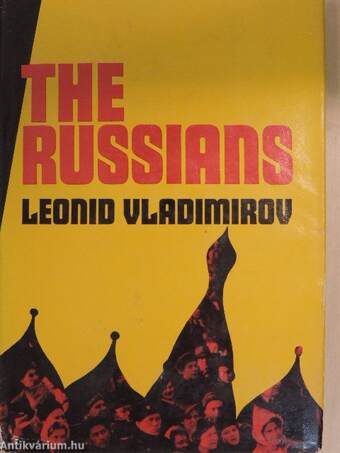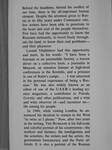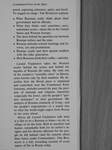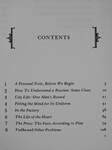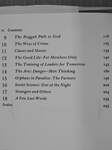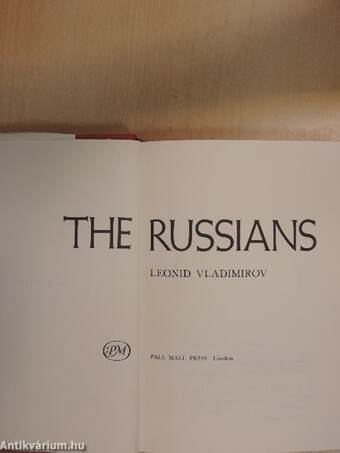1.067.308
kiadvánnyal nyújtjuk Magyarország legnagyobb antikvár könyv-kínálatát

VISSZA
A TETEJÉRE
JAVASLATOKÉszre-
vételek
The Russians
| Kiadó: | Pall Mall Press |
|---|---|
| Kiadás helye: | London |
| Kiadás éve: | |
| Kötés típusa: | Varrott keménykötés |
| Oldalszám: | 249 oldal |
| Sorozatcím: | |
| Kötetszám: | |
| Nyelv: | Angol |
| Méret: | 22 cm x 14 cm |
| ISBN: | 269-1626-X |
naponta értesítjük a beérkező friss
kiadványokról
naponta értesítjük a beérkező friss
kiadványokról
Fülszöveg
Behind the headlines, behind the conflict of our time, there is the all-important humán element. Despite the attention given to Russia in its fifty years under Communist rule, few writers have been able to penetrate to the heart and soul of the people themselves. Few have had the opportunity to know the Russians intimately, to travel freely throughout the land, to know their real problems- and their pleasures. Leonid Vladimirov had this opportunity and more. In his words: "I have been a foreman in an automobilé factory, a tractor driver on a collective farm, a journalist in Moscow, an attentive listener at high-level conferences in the Kremlin, and a prisoner in one of Stalin's camps. ... I was saturated in the personal experience of being a Russian." He was alsó widely known as an editor of one of the U.S.S.R.'s leading science magazines, a contributor to Pravda, Izvestia, and other publications, and a wise and witty observer of-and raconteur on- life among his people. In 1966,... TovábbFülszöveg
Behind the headlines, behind the conflict of our time, there is the all-important humán element. Despite the attention given to Russia in its fifty years under Communist rule, few writers have been able to penetrate to the heart and soul of the people themselves. Few have had the opportunity to know the Russians intimately, to travel freely throughout the land, to know their real problems- and their pleasures. Leonid Vladimirov had this opportunity and more. In his words: "I have been a foreman in an automobilé factory, a tractor driver on a collective farm, a journalist in Moscow, an attentive listener at high-level conferences in the Kremlin, and a prisoner in one of Stalin's camps. ... I was saturated in the personal experience of being a Russian." He was alsó widely known as an editor of one of the U.S.S.R.'s leading science magazines, a contributor to Pravda, Izvestia, and other publications, and a wise and witty observer of-and raconteur on- life among his people. In 1966, while visiting London, he announced his decision to remain in the West "to write as I please." Now, after two years in the writing, The Russians is his full-scale and colorful portrait of his countrymen-the workers and farmers, the intelligentsia and the scientists, the writers and the artists, the government bureaucracy and the Party offieials. It is alsó a portrait of the Russian(continued from front flap) mood, capturing substance, spirit, and detail. To suggest its rangé: The Russians explains • What Russians really think about their government and its officials. • What they think-and sometimes envy, sometimes scorn-about life in the United States and Western Europe. • The story behind the guerrilla war between Russian writers and the state. • Russian attitudes toward marriage and divorce, sex and prostitution. • Russian youth and their special conflicts with the older generation. • How Russians drink their vodka-and why. Leonid Vladimirov takes the Western reader behind the scenes and behind the fac^ades of Russian life today. He visits one of the country's "scientific cities" in Siberia, cities known only by their numbers. He describes how the Soviet press is organized and controlled, how the Communist Party functions, attitudes toward the past, the position of national and religious minorities (especially the Jews), and the people's "passive resistance" to their government. His analysis of Russian standards of living-and the people's expectations-is a sound clue to what the world might expect from Russia in the years ahead. Above all, Leonid Vladimirov telis what it is like to be a Russian at home-in city or village or on the farm. Rich in anecdote and humor, remarkable both for its author's insights and his obvious affection for the people he left behind (and his concern about their future under Communism), The Russians is a full, rewarding account of every aspect of life in Russia today. Vissza
Témakörök
- Szociológia > Szociográfia
- Idegennyelv > Idegennyelvű könyvek > Angol > Szépirodalom > Regény, novella, elbeszélés
- Idegennyelv > Idegennyelvű könyvek > Angol > Művelődéstörténet
- Idegennyelv > Idegennyelvű könyvek > Angol > Szociológia > Szociográfia
- Művelődéstörténet > Civilizációtörténet > Európai
- Művelődéstörténet > Kultúra > Kultúrantropológia
- Szépirodalom > Regény, novella, elbeszélés > Az író származása szerint > Európa > Szovjetunió
- Szépirodalom > Regény, novella, elbeszélés > Tartalom szerint > Riportregények
- Idegennyelv > Idegennyelvű könyvek > Angol > Szépirodalom
- Szépirodalom > Regény, novella, elbeszélés > Tartalom szerint > Kor- és társadalomrajz
- Szépirodalom
Leonid Vladimirov
Leonid Vladimirov műveinek az Antikvarium.hu-n kapható vagy előjegyezhető listáját itt tekintheti meg: Leonid Vladimirov könyvek, művekMegvásárolható példányok
Nincs megvásárolható példány
A könyv összes megrendelhető példánya elfogyott. Ha kívánja, előjegyezheti a könyvet, és amint a könyv egy újabb példánya elérhető lesz, értesítjük.



